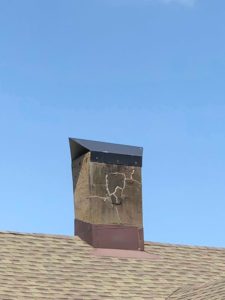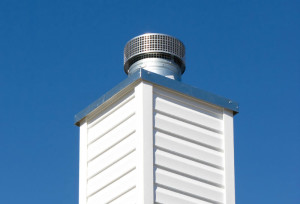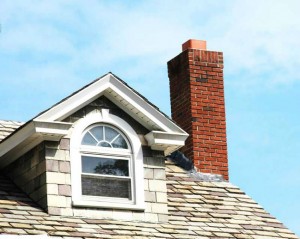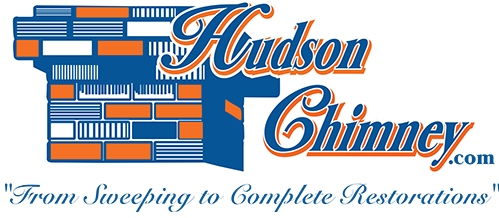by Mark Hudson | May 9, 2017 | chimney maintenance
When you acquire a property whether by inheritance or purchase, or when you sell a property, the chimney is quite a selling point. In fact, a fireplace is the most common factor that home buyers request. However, a new homeowner doesn’t want to be surprised with a faulty fireplace, unsafe chimney, and damaged home because of it.
CSIA Chimney Inspections
The Chimney Safety Institute of America (CSIA) prioritizes consumer safety, and strives to educate the public and train professionals in chimney and fire safety. CSIA credentials are nationally-recognized and its members offer three levels of CSIA inspections that are vital for chimney safety. A level two inspection is required for the transfer of property. It includes the basic assessment of a level one inspection as well as hidden portions that are accessed with special tools. A level two inspection also includes a video scan of the interior portions of the chimney system. In addition, a detailed report for your real estate agent, loan officer, and home buyer. The officials who have an interest in your sale, whether you’re the buyer or seller, will look for a CSIA signature on official documents.
Routine Maintenance and Repairs
When you buy a home with an existing chimney system, you have no assurance that the system has been properly maintained. The required chimney inspection is combined with a home inspection. This discloses any issues that might exist with the home and chimney system. If there is a chimney, you should receive a report of the required inspection. If the seller doesn’t repair damage prior to the sale, you should at least get a recommendation for repairs. Take the costs into account when making an offer for a home. If you’re working with a real estate agent, you might negotiate repairs before your purchase is final.
Selling Your Home
Your fireplace is a valuable selling point during a property sale. It’s wasted if you don’t take advantage. In order to make the most of your sell, you should keep your fireplace and chimney properly maintained. Before you put your home on the market, schedule a chimney sweep! This is so that your prospective buyers can’t smell the smoky soot in the fireplace. Your chimney sweep can assess the system during this appointment and present a report for your legal purposes. If you have been vigilant about your chimney’s maintenance over the years, your inspection should discover surprising damage, but it is still required.
Fireplace Facelift
Is your chimney is functional, but the fireplace is worn? You can update it with a beautiful and efficient fireplace insert. This can work together with your existing chimney. Before a sale is the best time for a fireplace facelift. Why? Because you can increase your price substantially with far less cost than you gain.
Hudson Chimney offers both gas and wood-burning inserts that will fit your space perfectly, whether you’re selling or buying a home. A Hudson Chimney sweep is standing by to make your purchase or sale as easy as possible. Call 904-282-4159 today, or contact us online.
by Mark Hudson | Aug 11, 2016 | chimney maintenance
If you have noticed a discolored stain on the exterior of your chimney, you have good reason to be concerned. Not only is discoloration on a chimney exterior unattractive, but it also can signal a problem that could lead to more chimney damage. Different colors can signify different problems, and it is important to know which colors appear with each issue to troubleshoot the needed repairs. For over 30 years, Hudson Chimney has been serving the chimney maintenance, repair, and installation needs to residents of the Jacksonville area, and you can trust us to diagnose the cause of the discoloration and fix the problem behind the stains. Our chimney technicians have been certified by the Chimney Safety Institute of America (CSIA), so you are getting both experienced and trained chimney service from us. We would like to tell you the possible causes behind different colors of stains on the exterior of your chimney to help you know more about the reason for the discoloration.
WHITE STAINS
If the discoloration you notice on the outside of your chimney is white, you are seeing efflorescence stains, which is formed by mineral salt remaining on the bricks and mortar from the evaporation of water. While efflorescence could be caused by rain blowing against the chimney during a storm, this discoloration often signifies the existence of a chimney water leak. Hudson Chimney can inspect your chimney to find the leak, repair the source of the leak, and remove the stains. To prevent water penetration of your chimney and efflorescence, we recommend our waterproofing service that creates a barrier to water penetrating the bricks and mortar and also keeps efflorescence from discoloring your chimney.
BLACK OR BROWN STAINS
While darker stains can also be the result of water penetration in the case of mold, Hudson Chimney finds black or brown chimney stains to more commonly be discoloration from creosote or soot. The appearance of creosote running out of the top of your chimney should be taken seriously as a strong risk of a chimney fire. Creosote is extremely flammable, and if enough creosote is in your chimney that it is pouring out, you definitely have enough creosote inside to ignite a chimney fire. If you have a gas fireplace, black or brown stains are not creosote but soot and are an equally important warning sign. According to Inspectapedia, soot stains should alert you to a dangerous situation of a high risk of the overproduction of carbon monoxide inside the chimney. You should contact Hudson Chimney as soon as possible when you see black or brown stains to have us take care of these safety hazards.
RED STAINS
When you see red or reddish-brown discoloration on the exterior of your chimney, you have an issue with rusting. The most common cause for rust stains is corrosion damage on your metal chimney cap. If your chimney cap has suffered from corrosion, it could be damaged by cracks that will allow water to leak into your chimney to cause even more damage. Hudson Chimney can help by installing a new chimney cap that will protect your chimney from water leaks.
The color of stains on the outside of your chimney can alert you to a serious chimney problem that could make your fireplace unsafe to use. Contact us at Hudson Chimney to schedule an inspection to determine the source of discoloration and make the necessary repairs.
by Mark Hudson | Jun 27, 2016 | chimney maintenance
During the summer, your fireplace is probably the last thing you are thinking about, but unpleasant odors coming into your home from your chimney through the fireplace will quickly remind you. Hudson Chimney has been working on the chimneys of Jacksonville area residents for over 30 years, and we have lots of experience with diagnosing and solving chimney odor problems. The heat and humidity of the summer months can worsen these stinky smells, and, because your home is weatherized to keep the cold air inside, you are more likely to have chimney draft problems that allow these odors to be blown into the house. Different things can cause chimney odors, and we would like to tell you a bit more about these smelly factors and how we can take care of your stinky chimney.

Do you notice a bad barbecue or asphalt odor?
If it smells like someone has burned food on the grill or like your street is being paved, the source of your chimney odor is creosote. Formed naturally during the combustion process of burning wood, creosote sticks to the inner walls of your chimney and can accumulate into large deposits. Not only does creosote have a strong, acrid odor, it also is so highly flammable that the Chimney Safety Institute of America (CSIA) says that creosote is a leading cause of chimney fires. To keep your home smelling sweet and to reduce your risk of a chimney fire, Hudson Chimney recommends scheduling your annual chimney sweeping in the spring or summer. Our CSIA-certified chimney sweeps will make sure to remove every bit of creosote from the inside of your chimney.
Is the smell musty?
If you notice a musty odor, you most likely have standing water on the smoke shelf. To keep water out of your chimney, you need a good quality chimney cap professionally installed on the top of the chimney. Without a cap, water from rain can easily get into your chimney and land on the smoke shelf. Leaves, sticks, and dirt can also fall into your chimney, and when this debris mixes with standing water, you could end up with a rotting odor coming from your chimney. Hudson Chimney offers a wide variety of chimney caps, and we can help you pick out the perfect cap for your chimney and install it to protect your chimney from water leaks.
Has your home been invaded by a rotting, decomposing stench?
The worst case odor scenario is a dead bird, squirrel, raccoon, or other wild animal in your chimney. These critters often mistake chimneys for trees and get inside the flue to nest. Unfortunately, it can be easy for a bird or animal to become trapped inside and die within your chimney. To prevent this situation from occurring, you need a chimney cap that is equipped with mesh metal sides that will keep birds and wild animals from being able to get into the chimney. Hudson Chimney knows which caps work the best against animal invasions and can help you stop these creatures from nesting inside your chimney.
Keep your home smelling fresh this summer. Contact us at Hudson Chimney to schedule an appointment for a chimney sweeping and inspection today.
by Mark Hudson | Apr 7, 2016 | Chimney Liner, chimney maintenance
If you have an older masonry chimney, you most likely have a clay tile liner. While these liners are durable and long-lasting, the clay tiles do crack and break off over the years. Repairing clay tile liners can be costly and time-consuming, but, fortunately, there is another alternative. Hudson Chimney is proud to offer the HeatShield system to repair and reline clay tile liners. We have been certified by the company that manufactures HeatShield, so you can trust our skills, experience, and training to use this product properly and successfully. We are often asked about this relining system, so we would like to tell you more about HeatShield and how it can restore your chimney liner.

What exactly is HeatShield?
A specially created “Cerfractory” sealant, HeatShield was developed 20 years ago in Europe to restore your chimney to its original level of safety and efficiency. When your clay tile liner is damaged with cracks and gaps, it can be dangerous as these voids allow toxic gases like carbon monoxide to leak back into your home. An environmentally friendly product made from recycled and naturally occurring materials, HeatShield is a less expensive way of relining a chimney, compared to rebuilding your chimney or removing clay tiles to install a new liner.
How does HeatShield repair my clay tile chimney liner?
If Hudson Chimney determines that your liner simply needs repairing, we can use one of two HeatShield methods: the Joint Repair System, if only defective mortar joints are found, or the Resurfacing System, if you have both damaged mortar joints and other minor defects in the tile liner. With the Joint Repair System, we take a special foam applicator blade that has been customized to fit your chimney and place it down your chimney to position it below each gap or void. We then add the HeatShield Cerfractory Flue Sealant mixture to fill in every void. Once the voids have been filled, we will pull the blade upward, which will smooth the repaired voids. The Resurfacing System is very similar, except we will use a customized foam applicator plug. This plug will be placed at the bottom of your flue and attached to a winch at the top of the flue. A primer is applied first, and then we will add the HeatShield mixture. As the plug is pulled up by the winch, the mixture will be smoothed to the right thickness. For both systems, the work will be checked by viewing the footage from the video camera at the bottom of the blade or plug. This ensures the repairs have been done properly.
How can HeatShield replace my liner?
If your clay tile liner is damaged beyond repair, Hudson Chimney can use the CeCure Sleeve Relining System. This process begins with a coat of HeatShield, which is applied with the same type of plug used in the Resurfacing System. Next, the CeCure Sleeve, which is a ceramic insulation sleeve that has been reinforced with stainless steel fabric, will be lowered into your chimney and attached mechanically to the top of the chimney. We then pull the plug down the chimney to press it into the first coat of HeatShield. Finally, another coat of HeatShield will be applied over the CeCure Sleeve. This procedure will also be video recorded and viewed afterwards to be sure the sleeve is in the proper place.
If your clay tile liner needs repairing or replacing, HeatShield can be the perfect solution. Contact us at Hudson Chimney to schedule an inspection of your clay tile liner today.
by Mark Hudson | Mar 24, 2016 | Chimney Chase Cover, chimney maintenance
Protecting your chimney from water leaks is an important part of maintaining your chimney. If you have a prefabricated chimney, you likely have a chase that is built around its metal exhaust pipe. When you have a chase around your chimney, it needs to have a good chase cover (also known as a chase pan) that will keep water out of your chimney and chase. Water is the greatest enemy of chimneys, according to the Chimney Safety Institute of America (CSIA). You want to be sure you are doing everything you can to prevent water from penetrating your chimney because of the damage water can do. Not only can water damage the metal components of your chimney, but it can also cause damage to the ceilings and walls in your home. Unfortunately, chase covers do not last forever and should be replaced when you notice any signs of damage. Hudson Chimney sells, installs, and repairs chimney chase covers, and we would like to tell you what you should look for to know it is time to replace your chase cover.

How do I know if my chase cover is damaged?
Although you may have to get on your roof to get a closer look, you will probably be able to see signs of corrosion from rusting on your chase cover from the ground. Chase covers are made from metal, and the cheaper metals tend to start rusting pretty quickly. As soon as your chase cover starts rusting, the cover will develop holes in it, and these holes allow rain to easily enter your chimney. While Hudson Chimney can repair chase covers, if the cover is made from galvanized steel, the metal is probably to weak to repair. You cannot even clean the rust corrosion off of the chase cover because it could break apart.
What should I be looking for in a replacement of my chase cover?
You want to find a chase cover made from either stainless steel or copper. You also want to be sure the cover has been designed correctly. Look for a chase cover that has been designed with a slope from the middle to the sides so that water will run off of the cover and not pool on top in the middle. When water pools on top of a chase cover, it leads to quicker corrosion. Hudson Chimney can help you select the best chase cover for your chimney. No matter if you have multiple flues in one chimney or have an unusually shaped chimney, we can customize a chase cover to protect your chimney and chase from water penetration.
Is it time to replace your chase cover? Contact us at Hudson Chimney to find out how we can help you prevent damage from water leaking into your chimney with the perfect chase cover for your chimney chase.
by Mark Hudson | Sep 15, 2014 | chimney maintenance
Chimney service companies tend to get busy as the fall and winter approach. If you live in the Middleburg, Florida area you may think that booking an appointment to have your chimney swept and inspected is something that can wait. After all, you live in the sunshine state, right? But you would be wrong. The Chimney Safety Institute of America recommends that chimneys be swept by a professional on an annual basis. No matter where you live, the fall and winter are when chimney service companies get booked up. If you want to use your chimney safely and efficiently this winter, you will want to have the professionals at Hudson Chimney clean and inspect it.

Having your chimney cleaned and inspected can help it to run more efficiently, save you money, and keep your home warmer. Most importantly, however, having your chimney cleaned is important to keeping your home safe from house and chimney fires, carbon monoxide poisoning, and other hazards presented by owning a chimney.
The professionals at Hudson Chimney will work to remove creosote from your chimney. Creosote is an extremely flammable substance that forms when hot gasses and smoke cool in your chimney. Not only can creosote cause fires, but it blocks toxic gasses and smoke from leaving your chimney. When creosote is allowed to accumulate, not only does your risk of fire and dangerous fumes increase, but creosote will build into a caked on substance called glazed creosote, which can only be removed by a professional with strong chemicals. Having your chimney cleaned and inspected annually can help prevent glazed creosote from forming.
The experts at Hudson Chimney will also inspect your chimney for water damage which can cost you a lot of money (and even destroy your chimney) if not properly attended to. They will inspect your chimney for the various causes of water leaks and recommend any repairs that need to be made. You can then set up an appointment with Hudson Chimney to install a chimney cover, have a water repellent applied, or anything else that needs to be done to provide you with a leak-free chimney!
Your chimney will also be inspected to make sure that the appliance was properly installed and that your chimney and appliance are compatible. A flue that is too small for the appliance will not allow for proper ventilation, causing hazardous fumes to enter your home. A flue that is too big for the appliance will accumulate creosote quickly. The technicians at Hudson Chimney will also check to make sure that there are no blockages in your chimney that could cause improper ventilation. Having a chimney cap or damper installed will help to prevent animals and debris from entering the chimney.
So if you have not scheduled your chimney service appointment for this year, call Hudson Chimney as soon as possible to book your appointment before the busy season starts!





